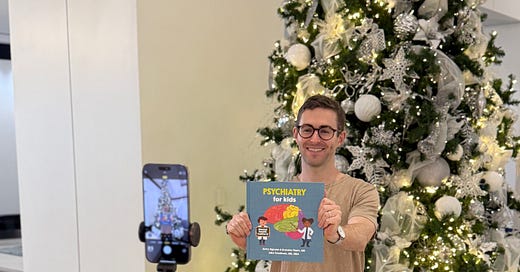hot take: financial wellness is mental wellness.
As a mental health doctor, I’ve seen the impact of financial stress on my patients’ mental health. Constantly worrying about bills, unexpected expenses, or looming debts can leave you feeling anxious, overwhelmed, and even hopeless. This conversation is especially important around the holidays - when financial stress around traveling and gift-giving are front and center.
Let’s dive into why building financial stability, starting with an emergency fund, is an underrated way to support your mental health.
Financial Mental Health: Why You Need an Emergency Fund
As the phrase goes, sh*t happens.
Last month, we heard a crunch under our dinner table — a few moments later we discovered that the dog we were dog-sitting chewed up my wife’s retainer—boom, $250. Around that time, our A/C needed maintenance. Boom - hit again with an unexpected expense.
These unexpected expenses can feel overwhelming, but thanks to our emergency fund, we were prepared.
An emergency fund isn’t just a financial safety net—it’s peace of mind. Having a readily accessible savings cushion for unexpected expenses prevents the stress of scrambling to find the funds or dipping into debt.
Why a High-Yield Savings Account (HYSA) Matters:
A HYSA is an account where your funds are easily accessible, ensuring that your emergency cash is available when you need it. It’s also FDIC insured (usually up to $250K), which means that money is protected by the government if something were to happen to the bank.
Why not keep the emergency fund in a traditional savings account or a brokerage account? Well, a HYSA offers higher interest rates than a traditional savings account (at the time of this newsletter, HYSA’s can have rates above 4%). Keeping your emergency fund in a brokerage account can be risky in case the market performs poorly and the fund loses value. Also HYSA’s keep your funds liquid—meaning you can access them anytime without penalty.
Popular online banks often have competitive rates for HYSA’s. If you haven’t yet, take a few minutes this week to research and set up an account. Your future self will thank you!
Gift Ideas for Better Sleep
If you or someone you love struggles with sleep, consider these thoughtful gifts to promote restful nights:
Loop Earplugs
These earplugs reduce noise and sensory input, perfect for anyone who needs calm to fall asleep or wants hearing protection at concerts or sporting events. They’re also my go-to for noisy environments like airplanes or bustling cities. Find them here.Sunrise Alarm Clock
Say goodbye to harsh alarm sounds and wake up gently with a clock that simulates sunlight. The Philips Wake-Up Light is my favorite (although there are less expensive versions!) —it’s soothing and makes mornings infinitely better. Check it out here.Lavender Essential Oil Spray
A quick spritz on your pillow can help create a calming bedtime routine. Lavender’s soothing aroma is a natural way to unwind and prepare your body for sleep.
Celebrating One Year of Psychiatry For Kids
One year ago, two of my fellow residents and I took a huge leap and self-published Psychiatry For Kids, a children’s book we dreamed would educate young readers about mental health and break down stigma.
What started as a passion project has turned into something we couldn’t have imagined. Within days, it became an Amazon Best-Seller in mental health, and soon it was selling internationally, featured on local TV, and translated into Spanish (Psiquiatría para niños).
This book was created for the next generation—to empower kids and families to have open conversations about mental health in an engaging, approachable way.
To those of you who have supported this journey: thank you. If you’re looking for a meaningful holiday gift, I’d love for you to share Psychiatry For Kids with a young person in your life.
Thank you for being here, and have a great week!
—Dr. Jake
Disclaimer:
This newsletter is for informational purposes only and does not constitute medical advice. The content shared is based on evidence-supported research and my personal experiences but is not intended to replace professional medical advice, diagnosis, or treatment. Always consult your personal doctor or a qualified healthcare professional before starting new treatments, making changes to your health routine, or addressing specific medical concerns.




Without financial security, the stress and anxiety will eat you up. Money isn't everything until you don't have enough.
Hey Dr. Jake:
How do I feel financially secure when I can’t find gainful employment? Every application is rejected, from vice president to third shift cheese wrapping. What the hell am I supposed to do now?